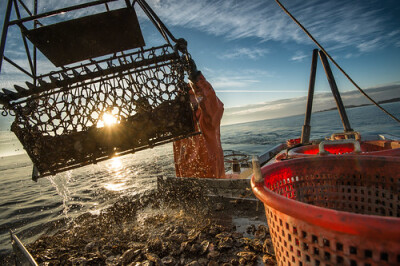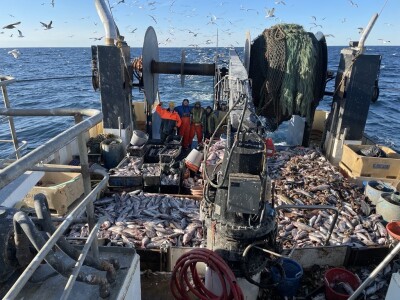A tale of two councils
If I had a dollar for every time the North Pacific council was offered up as fishing's example of the Truth, the Way and the Light, I'd be writing this from my winter home on Kauai.
On the other hand, if I had to hand over a dollar every time the New England council was condemned as being incapable of reigning in overfishing, I'd be living in a cardboard box, almost certainly without a laptop to write on and most definitely without benefit of spousal companionship.
Most recently, we have seen the North Pacific council roundly praised by fishing groups, scientists and conservationists for its pre-emptive ban on U.S. fishing in the waters of the Arctic Ocean.
Surveys do not now suggest there is a vast, harvestable biomass of fish in the Arctic, nor is much fishing going on. But with sea ice receding in the Chukchi and Beaufort seas, there is concern that stocks to the southward, such as pollock and crab, might expand in that direction.
So a little precaution could go a long way, not only in protecting the resource, but in helping us come to terms with the other fishing powers that border the Arctic Ocean — Norway, Denmark, Iceland, Russia, and the European Union — on how to manage the resource before we head down the road to perdition.
On the East Coast, meanwhile, where we have trod the road to perdition since before there was pavement, the council continues its Sisyphean battle to right wrongs long since committed.
In 1497, when the English explorer John Cabot came upon Newfoundland (500 years after Norse explorer Leif Ericson established fish settlements), he is reported to have said that "the sea there is full of fish that can be taken not only with nets but with fishing-baskets."
Groundfish there and throughout the northwest Atlantic would be aggressively pursued by the fleets of the western world for nearly 500 more years, and not until 1978 was the New England Fishery Management Council called upon to apply some restraint.
This winter, as North Pacific Council members were toasting a new Arctic policy, their colleagues in New England were battling the mother agency over how to derive the greatest public benefit from what remains of the resource in 2009.
The stage was set in January when U.S. District Judge Edward Harrington ordered NMFS to seriously consider a "mixed stock exception," as per agency regulations, that would give Yankees greater access to abundant stocks in the groundfish complex, which also contains stocks undergoing rebuilding.
Rather than comply with Harrington's ruling, NMFS asked the judge to reconsider it, a motion he rejected without comment.
The agency's position is that the judge threw the baby — the current set of groundfish rules — out with the bath water and that he has raised the specter of a number of dire impacts on fishermen.
You never know what's in a man's (or an agency's) heart, but this seems to me a vindictive line of reasoning that will only punish an industry that by any measure is hanging on by its fingernails.
A much more practical — and reasonable — interpretation of Harrington's ruling is that he wants NMFS to get cracking on the exercise of due diligence with respect to a mixed stock exception.
Indeed, council members felt compelled to reject, by an 11-6 vote, NMFS' request that they endorse its conclusion that the mixed stock exception would not work in New England.
It is as if NMFS read the judge's ruling and said, "OK, we thought about it, we still don't like it, we're done." Not even the staunchest conservationist can argue that the agency took to heart the judge's order to "seriously consider and analyze" the mixed stock exception.
Hard-line advocates will say the agency merely restated the obvious, that New England cannot afford the luxury of the mixed stock exception.
But what the judge and the council seem to have grasped is that the mixed stock exception is not a luxury: It is a necessity.
Will the New England council take political heat for this? Without question. Hard-line environmentalists do not allow themselves to be tainted by consideration of social impacts or craven thoughts of economic well-being, and such are their resources that NMFS dare not cross swords with them.
The New England council feels a little differently. New Englanders are used to contending with "the slings and arrows of outrageous fortune," just as the North Pacific council is accustomed to accolades for their enviable record of managing fish.
On the other hand, these councils have only been at it for 30 years, and that, as the ghosts of John Cabot, Leif Ericson and their shipmates would tell you, is just the twinkling of an eye.
– Jerry Fraser






